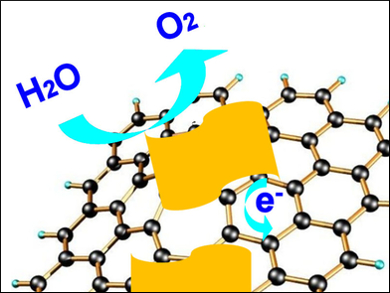Hydrogen is a clean fuel and can be readily obtained from the splitting of water. The efficiency of the process is, however, limited by the kinetics of the oxygen evolution reaction (OER). Considerable effort has been applied to developing catalysts for the OER that are both efficient and cheaper than the currently used platinum-group oxides.
Yu-Fei Song, State Key Laboratory of Chemical Resource Engineering, Beijing, China, and University of Chemical Technology, Beijing, and colleagues have developed a catalyst for the OER that is a composite of Co3O4 nanosheets and reduced graphene oxide. The highly earth-abundant cobalt is relatively cheap, and the nanosheet synthesis is easily carried out in a one-pot hydrothermal reaction. The nanocomposite was obtained by dispersing graphene oxide in the precursor solution of the Co3O4 nanosheets.
The nanocomposite has a high surface area, which contributes to its catalytic performance. In comparative tests, the composite performed better than a number of other cobalt oxide-based catalysts. Under identical experimental conditions, it even outperformed the commercially used iridium oxide/carbon catalyst. This makes the nanocomposite catalyst a promising material for the OER, which could also provide a pathway for the design of further materials.
- Facile Preparation of Ultrathin Co3O4/Nanocarbon Composites with Greatly Improved Surface Activity as a Highly Efficient Oxygen Evolution Reaction Catalyst,
Yanyan Chen, Jun Hu, Honglin Diao, Wenjing Luo, Yu-Fei Song,
Chem. Eur. J. 2017.
DOI: 10.1002/chem.201700225



